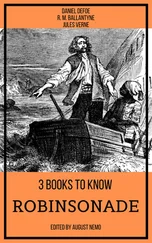“We is come,” answered the man with the swallow-tail, “from Aitutaki; we was go for Rarotonga. We is native miss’nary ship; our name is de Olive Branch; an’ our cargo is two tons cocoa-nuts, seventy pigs, twenty cats, and de Gosp’l.”
This announcement was received by the crew of our vessel with a shout of laughter, which, however, was peremptorily checked by the captain, whose expression instantly changed from one of severity to that of frank urbanity as he advanced towards the missionary and shook him warmly by the hand.
“I am very glad to have fallen in with you,” said he, “and I wish you much success in your missionary labours. Pray take me to your cabin, as I wish to converse with you privately.”
The missionary immediately took him by the hand, and as he led him away I heard him saying, “me most glad to find you trader; we t’ought you be pirate. You very like one ‘bout the masts.”
What conversation the captain had with this man I never heard; but he came on deck again in a quarter of an hour, and shaking hands cordially with the missionary, ordered us into our boat and returned to the schooner, which was immediately put before the wind. In a few minutes the Olive Branch was left far behind us.
That afternoon, as I was down below at dinner, I heard the men talking about this curious ship.
“I wonder,” said one, “why our captain looked so sweet on yon swallow-tailed supercargo o’ pigs and Gospels? If it had been an ordinary trader, now, he would have taken as many o’ the pigs as he required and sent the ship with all on board to the bottom.”
“Why, Dick, you must be new to these seas if you don’t know that!” cried another. “The captain cares as much for the Gospel as you do (an’ that’s precious little); but he knows, and everybody knows, that the only place among the southern islands where a ship can put in and get what she wants in comfort is where the Gospel has been sent to. There are hundreds o’ islands, at this blessed moment, where you might as well jump straight into a shark’s maw as land without a band o’ thirty comrades armed to the teeth to back you.”
“Ay,” said a man with a deep scar over his right eye. “Dick’s new to the work. But if the captain takes us for a cargo o’ sandal-wood to the Feejees, he’ll get a taste o’ these black gentry in their native condition. For my part, I don’t know, and I don’t care, what the Gospel does to them; but I know that when any o’ the islands chance to get it, trade goes all smooth and easy. But where they ha’n’t got it, Beelzebub himself could hardly desire better company.”
“Well, you ought to be a good judge,” cried another, laughing, “for you’ve never kept any company but the worst all your life!”
“Ralph Rover!” shouted a voice down the hatchway; “captain wants you, aft.”
Springing up the ladder, I hastened to the cabin, pondering as I went the strange testimony borne by these men to the effect of the Gospel on savage natures — testimony which, as it was perfectly disinterested, I had no doubt whatever was strictly true.
On coming again on deck I found Bloody Bill at the helm, and as we were alone together, I tried to draw him into conversation. After repeating to him the conversation in the forecastle about the missionaries, I said:
“Tell me, Bill: is this schooner really a trader in sandal-wood?”
“Yes, Ralph, she is; but she’s just as really a pirate. The black flag you saw flying at the peak was no deception.”
“Then how can you say she’s a trader?” asked I.
“Why, as to that, she trades when she can’t take by force; but she takes by force when she can, in preference. Ralph,” he added, lowering his voice, “if you had seen the bloody deeds that I have witnessed done on these decks, you would not need to ask if we were pirates. But you’ll find it out soon enough. As for the missionaries, the captain favours them because they are useful to him. The South Sea Islanders are such incarnate fiends that they are the better of being tamed, and the missionaries are the only men who can do it.”
Our track after this lay through several clusters of small islets, among which we were becalmed more than once. During this part of our voyage the watch on deck and the lookout at the masthead were more than usually vigilant, as we were not only in danger of being attacked by the natives (who, I learned from the captain’s remarks, were a bloody and deceitful tribe at this group), but we were also exposed to much risk from the multitudes of coral reefs that rose up in the channels between the islands — some of them just above the surface, others a few feet below it. Our precautions against the savages, I found, were indeed necessary.
One day we were becalmed among a group of small islands, most of which appeared to be uninhabited. As we were in want of fresh water, the captain sent the boat ashore to bring off a cask or two. But we were mistaken in thinking there were no natives; for scarcely had we drawn near to the shore when a band of naked blacks rushed out of the bush and assembled on the beach, brandishing their clubs and spears in a threatening manner. Our men were well armed, but refrained from showing any signs of hostility, and rowed nearer in order to converse with the natives; and I now found that more than one of the crew could imperfectly speak dialects of the language peculiar to the South Sea Islanders. When within forty yards of the shore we ceased rowing, and the first mate stood up to address the multitude; but instead of answering us, they replied with a shower of stones, some of which cut the men severely. Instantly our muskets were levelled, and a volley was about to be fired when the captain hailed us in a loud voice from the schooner, which lay not more than five or six hundred yards off the shore.
“Don’t fire!” he shouted angrily. “Pull off to the point ahead of you!”
The men looked surprised at this order, and uttered deep curses as they prepared to obey; for their wrath was roused, and they burned for revenge. Three or four of them hesitated, and seemed disposed to mutiny.
“Don’t distress yourselves, lads,” said the mate, while a bitter smile curled his lip. “Obey orders. The captain’s not the man to take an insult tamely. If Long Tom does not speak presently, I’ll give myself to the sharks.”
The men smiled significantly as they pulled from the shore, which was now crowded with a dense mass of savages, amounting probably to five or six hundred. We had not rowed off above a couple of hundred yards when a loud roar thundered over the sea, and the big brass gun sent a withering shower of grape point-blank into the midst of the living mass, through which a wide lane was cut; while a yell, the like of which I could not have imagined, burst from the miserable survivors as they fled to the woods. Amongst the heaps of dead that lay on the sand just where they had fallen, I could distinguish mutilated forms writhing in agony; while ever and anon one and another rose convulsively from out the mass, endeavoured to stagger towards the wood, and ere they had taken a few steps, fell and wallowed on the bloody sand. My blood curdled within me as I witnessed this frightful and wanton slaughter; but I had little time to think, for the captain’s deep voice came again over the water towards us: “Pull ashore, lads, and fill your water-casks!” The men obeyed in silence, and it seemed to me as if even their hard hearts were shocked by the ruthless deed. On gaining the mouth of the rivulet at which we intended to take in water, we found it flowing with blood; for the greater part of those who were slain had been standing on the banks of the stream, a short way above its mouth. Many of the wretched creatures had fallen into it; and we found one body, which had been carried down, jammed between two rocks, with the staring eyeballs turned towards us, and his black hair waving in the ripples of the blood-red stream. No one dared to oppose our landing now, so we carried our casks to a pool above the murdered group, and having filled them, returned on board. Fortunately a breeze sprang up soon afterwards, and carried us away from the dreadful spot; but it could not waft me away from the memory of what I had seen.
Читать дальше












